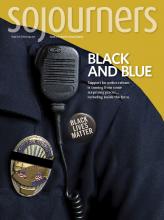Almost a decade ago, members of the faculty, administration, and student body at Hope College started a conversation about adding a program of peace studies at the Holland, Mich. campus. Last fall, the process reached an important milestone when the first “introduction to peace studies” course was offered to Hope’s 3,400 students, part of the school’s first ever peace and justice minor.
Administration officials talked about the difficulties in starting any new program at the college level. “First, you have to make a good argument as to why the program is needed at all,” said Alfredo Gonzales, Hope’s dean for international and multicultural education, who took part in those early discussions. “It’s difficult to introduce one more program at a liberal arts institute where there’s just an abundance of programs. In what ways are we going to add a program without adding another burden to our students?”
And that’s just the start of the process.
Once people at Hope decided that a peace and justice curriculum was indeed a good idea, Gonzales said they dove headfirst into logistical questions, such as whether Hope wanted to start with a full-fledged program or if they wanted to introduce it incrementally. Furthermore, they had to figure out which departments ought to be involved in creating such a multidisciplinary effort and what the academic requirements would be.
The process included many conversations among a lot of people, Gonzales told Sojourners, but he said he knew it would be worth it, and that a peace studies program was a natural fit for a school affiliated with the Reformed Church in America. “If we look at our mission statement, it says that Hope College is to educate students for lives of service and leadership in global society,” he said. “So in that framework, this program looks at questions of reconciliation in a world that is deeply torn and is injuring people from the very youngest to the very oldest in ways that we don’t even understand yet.”
Drawing on best practices
In a sense, peace studies is part of Hope College’s legacy: Iconic peace activist A.J. Muste graduated from Hope in 1905. The Dutch-American Muste would go on to be executive director of the Fellowship of Reconciliation—an interfaith peace organization—and to mentor Martin Luther King Jr. In the late ’50s, Muste protested New York City’s civil defense drills alongside Catholic Worker co-founder Dorothy Day, and in 1964, Muste participated in a retreat with a group of renowned peace activists, including Trappist monk Thomas Merton and Jesuit priest Daniel Berrigan.
As an academic field, irenology—the study of peace—is thought to have its formal genesis in mid-20th century Europe with the advent of peace research institutes. In the United States, the first institutions to teach peace were colleges and universities with ties to the historic peace churches: the Mennonites, the Quakers, and the Church of the Brethren.
Read the Full Article

